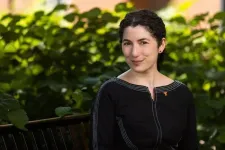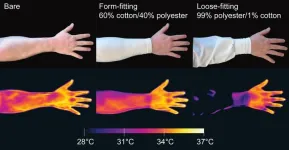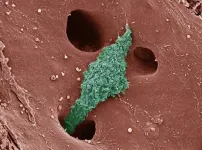Sylvester Cancer Tip Sheet for August 2024
2024-08-23
(Press-News.org) AUGUST 2024 TIP SHEET: A mouthwash-like rinse to predict head and neck cancer recurrence, new research identifies biomarkers to predict which colon cancer patients benefit from adjuvant chemotherapy, the Dolphins Cancer Challenge and StacheStrong team up to boost brain cancer research, the CDC issues anal cancer screening guidelines for HIV patients based partly on research at Sylvester, and three Sylvester physicians who become the latest early-career faculty scholars are highlighted in this month’s tip sheet from Sylvester Comprehensive Cancer Center at the University of Miami Miller School of Medicine. For more information on any of these story ideas or to arrange an interview, please contact Sandy Van. sandy.van@miami.edu or call/text 808.206.4576. Thank you.
HEAD & NECK CANCER
Can a Mouthwash-Based Test Predict Head and Neck Cancer Recurrence?
That futuristic scenario appears closer to reality following the results of a recent clinical trial conducted by researchers at Sylvester Cancer, UC San Diego Health and other cancer centers. Their study in JAMA Otolaryngology – Head & Neck Surgery could improve how physicians predict and detect recurrence with these cancers. “Our findings suggest biomarker detection in saliva collected from an oral rinse after initial treatment offers excellent potential for new tests to readily assess recurrence risk,” said Elizabeth Franzmann, M.D., Sylvester researcher and co-corresponding author of the study.
COLON CANCER
Study Finds Biomarker to Predict Chemotherapy Benefits for Colon Cancer
Many patients with Stage 2 or 3 colon cancer receive adjuvant, or additional, chemotherapy following surgery. But does that treatment improve survival outcomes for these patients? New Sylvester-led research published in Cell Reports Medicine has identified and validated a 10-gene biomarker that could predict whether these patients will benefit from adjuvant therapy. Additionally, the study led by Sylvester researcher Stephen Chen, Ph.D., found that the gene signature could potentially predict whether immunotherapy can benefit some of these patients.
BRAIN CANCER
Teaming Up to Bolster Brain Cancer Research
Dolphins Cancer Challenge (DCC) and StacheStrong have joined forces to raise awareness and funds for brain cancer research. Their philanthropic partnership, which commits to contributing $1 million over four years to benefit the newly opened Sylvester Brain Tumor Institute (SBTI), was announced last month on Glioblastoma Awareness Day. The partners have pledged to support four one-year brain cancer research projects at SBTI.
ANAL CANCER
New Screening Guidelines Designed to Protect Patients With HIV
The U.S. Centers for Disease Control and Prevention recently released the first federal guidelines for anal cancer screening in people with HIV, following a landmark study at Sylvester, Jackson Memorial Hospital and other cancer centers. The CDC guidelines were based on findings from the ANCHOR (Anal Cancer/HSIL Outcomes Research) study reported in 2022. It showed that treating potentially precancerous lesions reduced the risk of developing anal cancer by 60% over watchful waiting in people older than 35 with HIV.
GRANTS AND AWARDS
Sylvester Awards Its Latest Early-Career Faculty Scholars
Three Sylvester junior faculty members have become the latest recipients to join the prestigious ranks of its K12 Calabresi Clinical Oncology Research Career Development Program. Since 2018, the program has awarded 16 faculty members with the resources to pursue independent research careers in clinical and translational cancer research. This year’s awardees are Marcella Kaddoura, M.D., Division of Myeloma, whose research focuses on computational oncology in multiple myeloma; Noa Holtzman, M.D., Division of Transplantation and Cellular Therapy, who researches ways to improve outcomes for elderly leukemia patients undergoing stem cell transplantation; and Gretel Terrero, M.D., Division of Medical Oncology, who focuses on understanding the tumor microenvironment and genomic characteristics of pancreatic cancer.
on the InventUM blog and follow @SylvesterCancer on X for the latest news on its research and care.
# # #
END
ELSE PRESS RELEASES FROM THIS DATE:
2024-08-23
The anti-obesity medication semaglutide may help to prevent heart attacks and other major adverse cardiac events among overweight people who have cardiovascular disease, whether or not they also have heart failure, according to a new study led by UCL’s Professor John Deanfield.
The results follow previous research* from the same international team finding that weekly injections of semaglutide were linked to a 20% reduction in major adverse cardiac events (MACE) such as heart attacks and strokes for people with obesity or who were overweight and had cardiovascular disease.
The ...
2024-08-23
Most people — up to 94% of U.S. adults — experience at least some dulling of their senses with age, finding themselves squinting at screens, craving stronger flavors, and missing snatches of conversations more and more frequently. Researchers at the University of Chicago Medicine are looking into how these changes can go beyond mere inconvenience and actually worsen overall mental health in older adults.
“When your senses decline, you can't experience the world as well,” said Jayant Pinto, MD, a physician ...
2024-08-23
Scientists and engineers are ready to fly an infrared mission called EXCITE (EXoplanet Climate Infrared TElescope) to the edge of space.
EXCITE is designed to study atmospheres around exoplanets, or worlds beyond our solar system, during circumpolar long-duration scientific balloon flights. But first, it must complete a test flight during NASA’s fall 2024 scientific ballooning campaign from Fort Sumner, New Mexico.
“EXCITE can give us a three-dimensional picture of a planet’s atmosphere and temperature by collecting data the whole time the world orbits its star,” said Peter Nagler, the mission’s principal ...
2024-08-23
As climate change creates hotter, drier conditions, we are seeing longer fire seasons with larger, more frequent wildfires. In recent years, catastrophic wildfires have destroyed homes and infrastructure, caused devastating losses in lives and livelihoods of people living in affected areas, and damaged wildland resources and the economy. We need new solutions to fight wildfires and protect areas from damage.
Researchers at Stanford have developed a water-enhancing gel that could be sprayed on homes and critical infrastructure to help keep them from burning during wildfires. The research, published Aug. ...
2024-08-22
Professor of Ecology and Evolutionary Biology Nina Fefferman became a mathematician because she loves puzzles. She’s just been awarded $18 million from the U.S. National Science Foundation to solve one puzzle that has the potential to change the world: how, when and why an infection in a population will spread, or cause an epidemic or pandemic, rather than dying out.
Fefferman, director of the National Institute for Modeling Biological Systems and associate director of the UT One Health Initiative at the University ...
2024-08-22
(Santa Barbara, Calif.) — While a mosquito bite is often no more than a temporary bother, in many parts of the world it can be scary. One mosquito species, Aedes aegypti, spreads the viruses that cause over 100,000,000 cases of dengue, yellow fever, Zika and other diseases every year. Another, Anopheles gambiae, spreads the parasite that causes malaria. The World Health Organization estimates that malaria alone causes more than 400,000 deaths every year. Indeed, their capacity to transmit disease has earned mosquitoes the title of deadliest ...
2024-08-22
Faculty members in the Department of Emergency Medicine at the University of Colorado School of Medicine have been awarded $5 million by the U.S. Department of Defense to work with partners in Ukraine on clinical and logistical challenges associated with modern large-scale combat operations and prolonged casualty care.
The overarching program — Research and Scalable Infrastructure to Improve Outcomes on the Front Lines of Ukraine by Advancing Treatment and Evaluation (RESOLUTE) — is focusing on collecting data related to antibiotic-resistant wound infections, which have substantially increased amid the military conflict.
The initial project — ...
2024-08-22
ROCHESTER, Minn. — Mayo Clinic researchers are using artificial intelligence (AI) with an advanced 3D body-volume scanner – originally developed for the clothing industry – to help doctors predict metabolic syndrome risk and severity. The combination of tools offers doctors a more precise alternative to other measures of disease risk like body mass index (BMI) and waist-to-hip ratio, according to findings published in the European Heart Journal - Digital Health.
Metabolic syndrome can lead to heart attack, stroke and other serious health issues and affects over a third of the U.S. population and a quarter of people globally. ...
2024-08-22
Viruses like SARS-CoV-2 don’t respect boundaries, moving between species and continents and leaving destruction as they go. Beating the next pathogen with pandemic potential means getting good at crossing borders ourselves — between fields of study, between research universities, and between scientists and the wider community.
An $18 million grant announced by the U.S. National Science Foundation (NSF) will put that goal within reach. The award brings together five universities and more than 20 researchers, academics, and public health experts to establish the Virginia Tech-led Center ...
2024-08-22
Formerly known as nonalcoholic steatohepatitis, metabolic dysfunction-associated steatohepatitis (MASH) is an inflammatory disease characterized by liver scarring or fibrosis that progressively impairs liver function.
It is a major risk factor for cirrhosis and liver cancer. And because treatment options are limited, MASH is the second leading cause for liver transplants in the United States after cirrhosis caused by chronic hepatitis C infection.
A better understanding of the pathological processes that drive MASH is critical to creating effective treatments. In a new paper published ...
LAST 30 PRESS RELEASES:
[Press-News.org] Sylvester Cancer Tip Sheet for August 2024





